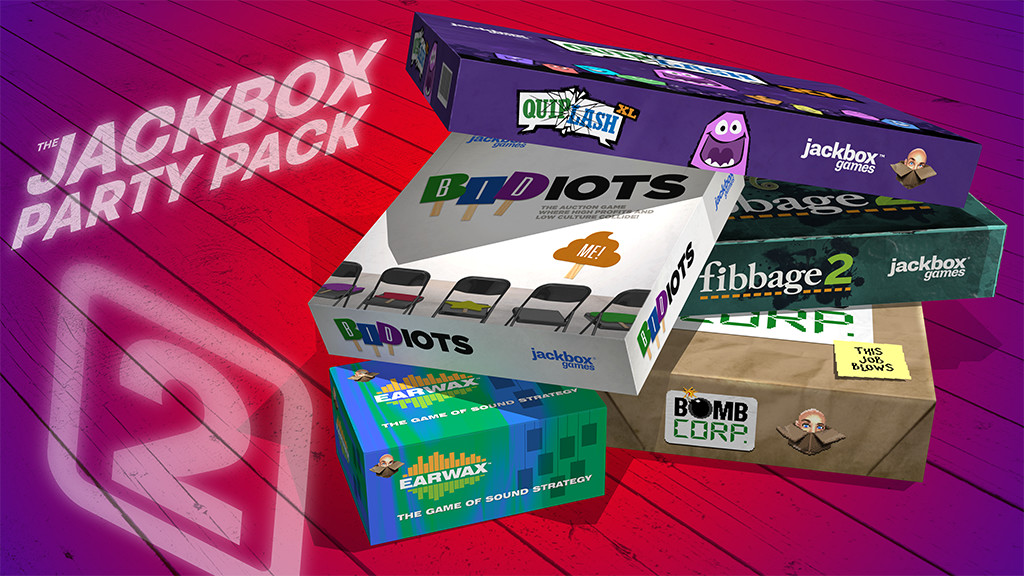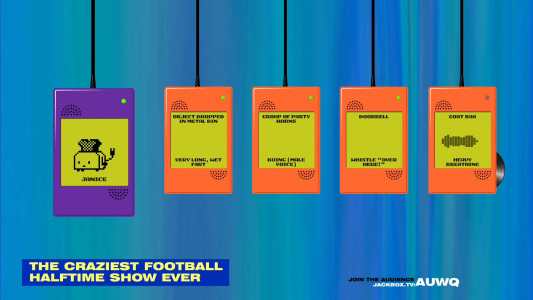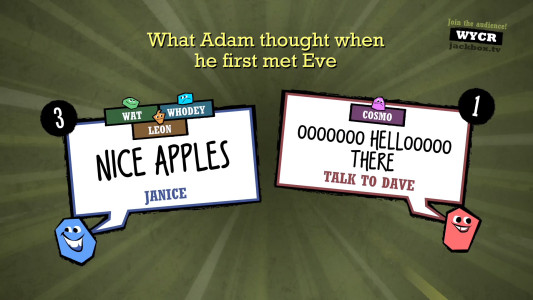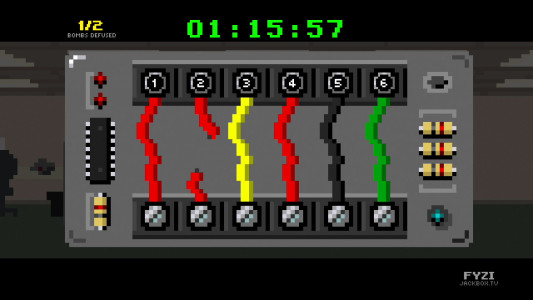Do you like fart jokes, making fun of people, and lying to your friends? If so, you might want to see a counselor, but in the meantime you also might want to check out Jackbox Party Pack 2.
Jackbox Party Pack 2 is a set of five multiplayer games where you use your phone as the controller. Those games include: Fibbage 2, Earwax, Bidiots, Quiplash XL, and Bomb Corp. All of these games are relatively easy to learn and quick to play, so they’re perfect for boring events like family gatherings, your local town hall meeting, or even that yearly seance that you keep holding in order to get those family secrets from great-great-Grandma Peterson.
Each of these games have their ups and downs, so here are my impressions of all of the games that the Jackbox Party Pack 2 has to offer.
Fibbage 2
Fibbage 2 is the “sequel” to one of the more popular games of the original Jackbox Party Pack. The core gameplay of Fibbage 2 is almost identical to the original: players type in their answers to trivia questions and try and fool each other into picking the lies that they’ve entered. Each player then chooses an answer and are awarded points for picking the real answer, but if they pick someone else’s lie, the liar is awarded points instead. At the end of the game, the player with the most points wins. “Likes” can also be awarded for the funniest answers, and at the end of the game the player with the most likes will win the Thumbs Cup.
What makes Fibbage great is that anyone can pick up and play with relative ease. The game is extremely fast-paced and never really suffers from any slow points; even if you’ve got friends who normally pick answers slower than an iceberg can run a marathon. After thirty seconds, they’ll forfeit their answer and the game will pick one instead. The newly added deFIBrilator give players the chance to eliminate all but one lie for any one question during the game, and while I wasn’t a huge fan of the feature, it made those extremely punishing questions a little easier to answer.
My only real gripe with Fibbage 2 is that Cookie Masterson, the announcer from the first Fibbage, is still as annoying as ever. He can be mildly entertaining at times, but more often than not his over-abundant puns and bad jokes left me more irritated than amused. However, one annoying announcer doesn’t detract from an otherwise great game.
Earwax
The premise of Earwax is relatively easy to understand; one player will choose a prompt and act as a judge for that round and the other players are given sets of weird noises (for example, “rock dropping in water” or “woman’s orgasm”). Each player chooses two noises that they feel best represent the prompt, and the judge awards a point to whichever set of noises that he / she liked best.
Earwax has a lot of weird noises to laugh at, and making strange, disturbing, and suggestive combinations is a ton of fun. Maybe only five years olds are supposed to still laugh at fart and poop jokes, but that didn’t stop me from shedding a few tears at a farting duck noise.
The game is silly and it can be fun to laugh at the bizarre noises, but that’s about all it’s good for. The sound pool is relatively shallow, I saw almost every sound with just a couple hours of play. Furthermore, because you only get a handful of sound choices for each prompt, it’s often hard to make a relevant or even mildly entertaining combination of sounds for every given prompt, making luck a larger factor than creativity.
Overall, Earwax functions pretty well as a silly noise simulator, but as a game it falls pretty flat.
Bidiots
Bidiots may be a bit dense and difficult to understand at first, but once you get past its clunky exterior, Bidiots shines as the most strategically complex game in this set.
The basic premise of Bidiots is that each player is an art buyer at an auction. The value of each painting is hidden, but each player is given three hints as to what some paintings might be worth. Players can also take out loans if they run out of money, or “screw” other players into bidding on a painting that they would have otherwise avoided. The goal of Bidiots is to end the game with the most money in pocket and with the most expensive paintings.
My initial reaction to Bidiots was a negative one; the rules were only sparsely explained in the very beginning of the game and new rules and mechanics would trickle in before I fully understood the original rules. It took me about the length of an entire game to basically understand the rules, but once the learning period was over the game really started to shine. Because of the unknown values of the paintings, bidding is tense and strategic; playing off of other players is a crucial part of success, and blind bidding often leads to quick depletion of funds. The art appraisers that pop up on the player’s’ individual devices are also a nice touch; they offer tips and secrets and do so without being obtrusive and annoying and add a lightheartedness to a surprisingly tense game.
Quiplash XL
Out of all of these Jackbox games, Quiplash is definitely my favorite. It’s simple, easy to learn, and has a ton of replay value.
Quiplash is like the bastard child of Fibbage and Drawful; in those games, the Thumbs Cup was a nice bonus, but in Quiplash it’s the grand prize. The premise is really simple; the game provides a prompt, and the player with the funniest answer (voted on by the other players) wins. It’s a simple premise, but it’s super easy to pick up and the prompts are varied enough that you could play this for tens of hours without hitting any repeats.
My only gripe with the game is that the scoring during the final round is a bit wonky. Every player provides an answer in the final round, and everyone has three votes to cast; however, you don’t have to cast all three of your votes, making it very easy for someone in the lead to withhold their votes in order to try and gain an advantage. If every player were forced to cast their votes or if every player only had one vote to cast the final round might be a bit more fair, but the way it works now isn’t very fair.
However, if unlike me, all of your friends aren’t dirty scoundrels, you should have a good time with Quiplash.
I should find some new friends…
Bomb Corp.
Bomb Corp. is the black sheep of the Jackbox Party Pack games; it’s got a story mode and it has a single-player mode, but despite its oddities, it’s perhaps the least interesting game in the bunch.
The player (or players) are newly hired employees of Bomb Corp, a company that specializes in defusing bombs. The object of each round is to diffuse each round of bombs by cutting the correct wires. One player uses his / her phone or tablet to choose which wires to cut, and the other players are given hints that help the bomb cutter in their wire-cutting decisions.
The biggest problem with this game is that is just isn’t fun. The puzzles aren’t very challenging and get very repetitive after only a few rounds. Furthermore, if played in multiplayer mode, only one of the players actually gets to play the game; the other players just have to read clues off of their phones and don’t fulfil a role that couldn’t be filled by some text floating on the screen. The dialogue from the narrator and the other character at Bomb Corp. can be funny and bizarre at times, but the occasional joke or weird outburst isn’t nearly enough to carry the unexciting gameplay.
Final Comments
If I might take a step back from the individual games themselves, I do have a couple of comments regarding the game as a whole.
In the first Jackbox Party Pack, during the lobby stage of each game, every player had the option of starting and stopping the game’s countdown meter. During my experiences with the game, this would always lead to some annoying player that would continuously delay the countdown. However, in this game, only the first player to join the lobby can start and stop the timer, thus preventing any unnecessary delays. It’s nice to see that the people at Jackbox didn’t just slap some new games in an old box, that they actually made some improvements to the overall package.
However, I would like to see some changes to the conveyance of the rules in the next Party Pack. Even though the rules of these games were relatively simple, I would have liked some sort of rules screen on either the main menu or the pause menu. The only time the rules for each game are ever explained is at the onset of the each round of play, but the announcers aren’t always super clear. This problem was most obvious for Bidiots; there were constantly new rules and mechanics being thrown out by the announcer and they were hard to follow during my first play session.
All in all, I think that Jackbox Party Pack 2 is a pretty solid collection of games. Even though not all of the games are quite up to snuff, there aren’t any obvious duds and the gems far outshine their duller counterparts. If you’ve got some time to kill and some friends to play this with, I would definitely give it a go. Jackbox Party Pack 2 is available on Xbox Live for Xbox 360 and Xbox One, on PlayStation Network for PS3 and PS4, Steam, Amazon Fire TV, the Humble Store, and on the Mac App Store.






